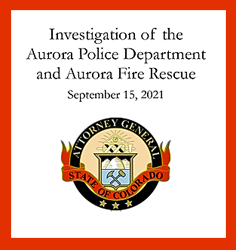We, an investigation team appointed by Colorado’s Attorney General, Phil Weiser, find that the Aurora Police Department and Aurora Fire Rescue have a pattern and practice of violating state and federal law. Specifically, we find that Aurora Police has a pattern and practice of racially biased policing, using excessive force, and failing to record required information when it interacts with the community. Aurora Fire has engaged in a pattern and practice of administering ketamine in violation of the law.
So begins the recently released investigation report from the Colorado Attorney General’s Office on the Aurora Police Department and Aurora Fire Rescue.

In addition to officer misconduct, findings show that a lack of guidance and failure to communicate expectations for responsible behavior led to the frequent use of force by officers in their interactions with members of the community. Personnel review and discipline systems were deemed ineffective and current hiring practices by Aurora’s Civil Service Commission do not reflect the diversity of the community.
The complete report with the investigation team’s findings and recommendations can be found in the State Publications Library’s digital repository. Make sure to check out the Technical Appendix for a detailed accounting of the data collection and metrics used by the investigation team.
This investigation is just one of many efforts resulting from the Criminal Justice reform efforts by the state of Colorado. In the past two years there have been many bills passed that focus on criminal justice. The Colorado Legislative Council Staff have pulled together a list of the reformative bills in a memorandum: “Criminal Justice Reform Legislation in Colorado: 2013-2021” with the bill numbers and a brief summary for each one.
Three of note that are related to policing:
- SB20-217 Enhance Law Enforcement Integrity
Ends qualified immunity for law enforcement officers; requires local law enforcement and the Colorado State Patrol to use body-worn cameras and release recordings to the public; requires data reporting about certain incidents and contacts with the public; creates a public database of officers who have been decertified, fired, found to be untruthful or in violation of training standards; limits the acceptable use of force by all peace officers and creates a duty to report excessive use of force; bans chokeholds and carotid holds; allows for the Attorney General to intervene in instances where a government authority engages in a pattern or practice that deprives persons of their constitutional rights; increases citizen protections from police tear gas and projectiles; and, declares that the issues addressed within the bill are a matter of statewide concern. - HB21-1250 Measures to Address Law Enforcement Accountability
Makes adjustments to provisions in SB20-217 described above and addresses officer de-escalation techniques; clarifies use of force and imminent danger; adds the Colorado State Patrol; expands uses for body worn cameras; makes new contact reporting requirements; and, closes a loophole that allowed for officers to avoid personal liability for misconduct, among other changes. - HB21-1251 Appropriate Use of Chemical Restraints on a Person
Limits a paramedic’s use of ketamine and other chemical restraints and prohibits peace officers from influencing or directing the drug’s use on an individual.
To find the text of other bills on the list, use the “Search by Bill” feature on the Colorado General Assembly web page.
If you would like dig a little deeper, check out the “Crime & Justice in Colorado 2009-2019” report from the Colorado Department of Public Safety.
- Have you Registered to Vote? - September 17, 2024
- The Castlewood Canyon Flood of 1933 - August 3, 2023
- Holiday Selections - December 22, 2022